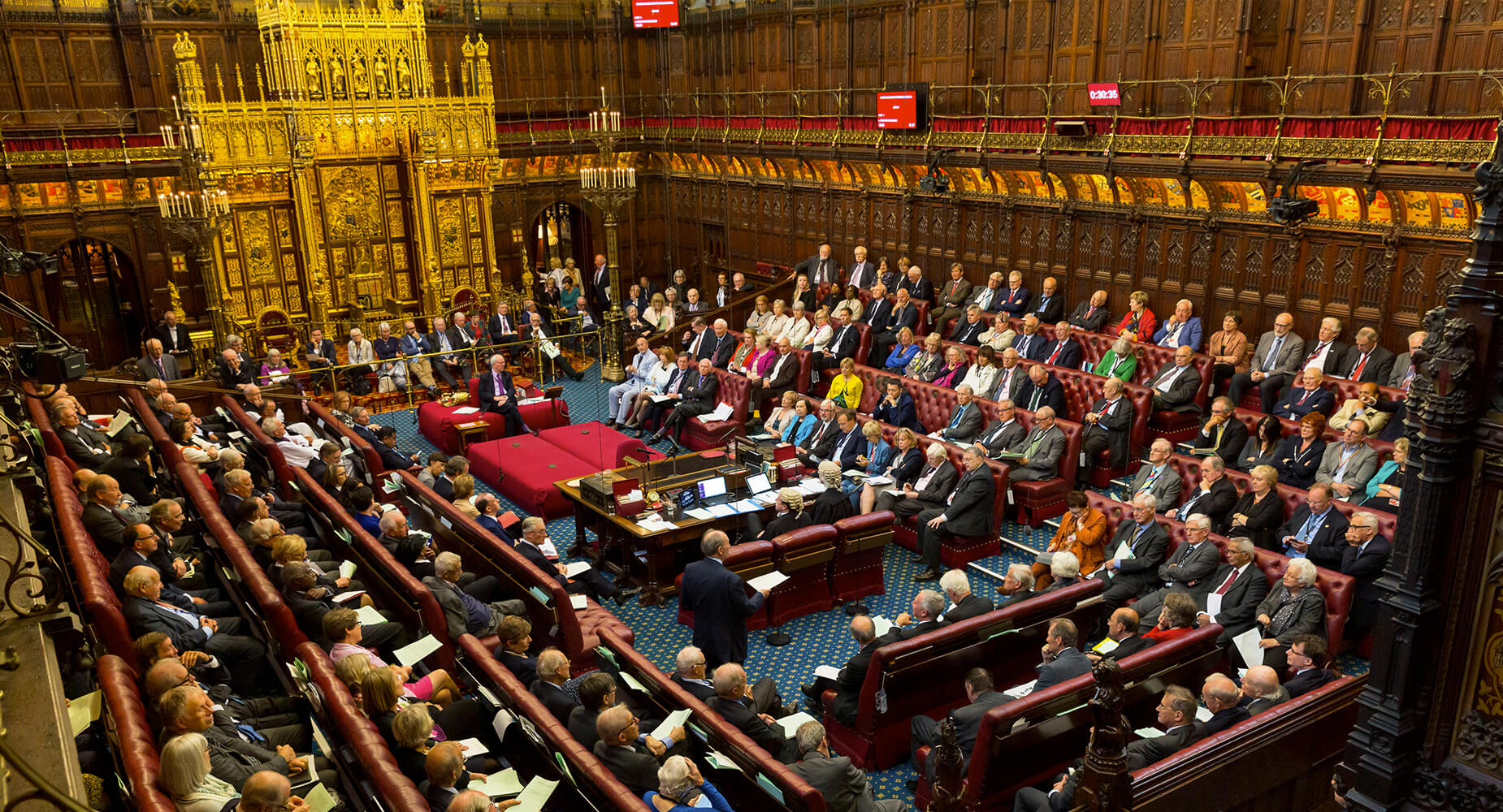Image: Copyright House of Lords 2019 / Photography by Roger Harris
The United Kingdom’s political system is made up of three branches – the legislature, executive and judiciary – and their various institutions, each playing a unique yet interlocking role in the governance of the nation. The ‘legislature’ includes Parliament, with the making and shaping of laws taking place in two chambers – the House of Commons and the House of Lords.
But how exactly does the House of Lords work, and how are appointments to the so-called ‘Upper House’ made? Here, we provide an overview of the House of Lords and its primary functions, and explore the arguments for and against the existence of the House of Lords in its current form.
What is the House of Lords?
The House of Lords is one of the two bicameral houses of the Parliament of the United Kingdom, the other being the House of Commons. It is referred to as the ‘Upper House’ and serves as an independent yet complementary chamber for lawmaking and scrutiny of the Government’s work. Unlike MPs in the House of Commons, the members of the House of Lords, known collectively as ‘Peers’, are not elected, but appointed. That the House of Lords is not composed of elected representatives is controversial, with calls for both minor and wholesale reform gaining currency over the years.
Composition
There are currently almost 800 Members of the House of Lords, with the majority being ‘life peers’. There are various types of members of the House of Lords:
- Life peers, who are appointed for their lifetime by the King on the advice of the Prime Minister. This might include, for example, former elected representatives, including former Prime Ministers such as David Cameron and former party leaders, including Lord Howard and Baron Kinnock, previous leaders of the Conservatives and Labour Party respectively. It might also include former Speakers of the House of Commons, or specialists in their professional field – such as science, sports or the arts – who might not come from a political background.
- Bishops and archbishops of the Church of England, known as the Lords Spiritual.
- Hereditary peers, who inherit seats in the House of Lords – though their number has been significantly reduced through constitutional reforms. There are currently 91 remaining hereditary peers.
Roles and Functions
The House of Lords plays a crucial role in the legislative process, with Bills being introduced in either the House of Commons or the House of Lords before being examined by both Houses in turn until the legislation is agreed and passed into law. This ensures that legislation is well-crafted, thoroughly examined, and takes into consideration the various perspectives of peers sitting in the Upper House as well as MPs. Members of the House of Lords have the power to table amendments to legislation while also being able to reject Bills.
While many Bills introduced in the Commons go through the House of Lords smoothly, this is not always the case. Peers have the power to hold up, delay, or reject legislation. Sometimes Bills rapidly bounce back and forth between the House of Commons and the House of Lords if the Houses struggle to agree on the wording of a Bill, known as parliamentary ‘ping-pong’.
The House of Lords also acts as a forum for in-depth examination of key policy issues, drawing on the diverse knowledge and experience of its members, via parliamentary questions, debates and through the work of House of Lords Select Committees. There can sometimes be fewer party-political pressures in the Lords, allowing peers to engage in more independent and less divisive discussions. As a result, proponents of the Upper House argue that one of the most important features of the House of Lords is its greater focus on cross-party collaboration.
Importantly, the House of Lords does not have the same powers as the House of Commons when it comes to tax matters. While it can scrutinise and suggest amendments to financial legislation, the ultimate decision lies with the elected MPs in the House of Commons.
Status
Due to its status as an unelected chamber, the House of Lords adheres to the Salisbury Convention, in that the chamber will not oppose the Second or Third Reading of any government legislation that was explicitly mentioned in the governing party’s election manifesto, to ensure it does not hamper the will of the electorate.
The House of Lords Act 1999 significantly reduced the number of hereditary peers, but debates persist on reforming and replacing the House of Lords with an elected second chamber, or abolishing it altogether and having a unicameral system, as Sweden and Denmark do.
In December 2022, the Labour Party unveiled plans to overhaul the House of Lords as part of the former Prime Minister Gordon Brown’s Commission on the UK’s Future, which made recommendations on reform of the Lords, devolution of power and the future of the Union. Brown’s report recommended abolishing the House of Lords and replacing it with an elected ‘Second Chamber’ which would be called the Assembly of the Nations and Regions.
Labour Party leader Sir Keir Starmer has called the House of Lords “undemocratic” and “indefensible”.
Labour has since appeared to backtrack on its commitment for sweeping reform or abolition of the House of Lords in its first term of government and has instead suggested it would strengthen the independent House of Lords Appointments Commission, which vets potential appointees, as a way of addressing the various ‘cronyism’ scandals that have implicated the Lords.
Meanwhile supporters of the House of Lords point to the experience brought to the legislature by life peers, its more collaborative nature, and the fact that its members usually feel more able to act backed by their conscience and expertise without being encumbered by short-term electoral pressures.
Overview
The House of Lords is a distinctive component of the UK’s parliamentary system, supporting a thorough legislative process and providing important checks and balances on the Government of the day. While debates surrounding its reform and role in a modern democracy persist, the House of Lords currently remains a key institution in the making, shaping and scrutiny of legislation for the benefit of the United Kingdom.
As we head into an election year with transformative reform by the Labour Party potentially on the horizon, whether it will continue to exist in current form or not, remains to be seen.
**
At Pagefield, we understand the world of Westminster and Whitehall – we are specialists in Public & Regulatory Affairs with a long-history of supporting clients with tricky regulatory and policy issues. If you want to talk to us about how we can help you to engage UK political parties ahead of the General Election, please get in touch via hello@pagefield.co.uk.




